|
|
|
Sort Order |
|
|
|
Items / Page
|
|
|
|
|
|
|
| Srl | Item |
| 1 |
ID:
068051


|
|
|
|
|
| Publication |
New Haven, Yale University Press, 2006.
|
| Description |
ix, 214p.
|
| Series |
The Castle lectures in ethics, politics and economics
|
| Standard Number |
030010782x
|
|
|
|
|
|
|
|
|
|
|
|
Copies: C:1/I:0,R:0,Q:0
Circulation
| Accession# | Call# | Current Location | Status | Policy | Location |
| 050936 | 306.36/SEN 050936 | Main | On Shelf | General | |
|
|
|
|
| 2 |
ID:
042546
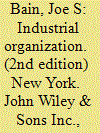

|
|
|
|
|
| Edition |
2nd edition
|
| Publication |
New York, John Wiley & Sons Inc., 1968.
|
| Description |
xiv, 678p.
|
|
|
|
|
|
|
|
|
|
|
|
Copies: C:1/I:0,R:0,Q:0
Circulation
| Accession# | Call# | Current Location | Status | Policy | Location |
| 003755 | 338/BAI 003755 | Main | On Shelf | General | |
|
|
|
|
| 3 |
ID:
040303


|
|
|
|
|
| Publication |
New York, Houghton Mifflin Company, 1970.
|
| Description |
xiii,422p.
|
|
|
|
|
|
|
|
|
|
|
|
Copies: C:1/I:0,R:0,Q:0
Circulation
| Accession# | Call# | Current Location | Status | Policy | Location |
| 008244 | 338.9/MAR 008244 | Main | On Shelf | General | |
|
|
|
|
| 4 |
ID:
040980
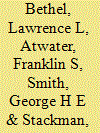

|
|
|
|
|
| Edition |
5th ed.
|
| Publication |
New York, McGraw Hill Book Company, Inc., 1971.
|
| Description |
xiv, 682p.Hbk
|
|
|
|
|
|
|
|
|
|
|
|
Copies: C:1/I:0,R:0,Q:0
Circulation
| Accession# | Call# | Current Location | Status | Policy | Location |
| 007774 | 658.51/BET 007774 | Main | On Shelf | General | |
|
|
|
|
| 5 |
ID:
188004
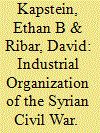

|
|
|
|
|
| Summary/Abstract |
The Syrian Civil War represents an extreme outlier in terms of the number of insurgent groups which have been engaged in the fighting. These groups have also been remarkably persistent over time, partly due to the fact that rebel in-fighting has been relatively contained. They have also targeted civilians far less than the Syrian Army. These stylized facts run counter to much of the existing literature on multi-party civil wars, which has emphasized the influence of the balance of power on group dynamics. In this article we instead draw upon balance of threat theory, along with insights from the economics of industrial organization, to understand insurgent behavior in the Syrian Civil War, based on a newly compiled dataset of rebel violence. Our research suggests that conflict scholars need to account for factors beyond the balance of power if they are to adequately explain inter-rebel dynamics.
|
|
|
|
|
|
|
|
|
|
|
|
|
|
|
|
| 6 |
ID:
091502
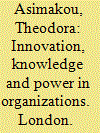

|
|
|
|
|
| Publication |
London, Routledge, 2009.
|
| Description |
199p.
|
| Series |
Routledge studies in global competition ; 45
|
| Standard Number |
9780415426664
|
|
|
|
|
|
|
|
|
|
|
|
Copies: C:1/I:0,R:0,Q:0
Circulation
| Accession# | Call# | Current Location | Status | Policy | Location |
| 054517 | 658.4063/ASI 054517 | Main | On Shelf | General | |
|
|
|
|
| 7 |
ID:
076295
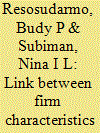

|
|
|
| 8 |
ID:
117992
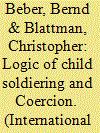

|
|
|
|
|
| Publication |
2013.
|
| Summary/Abstract |
Why do armed groups recruit large numbers of children as fighters, often coercively? The international community has tried to curb these crimes by shaming and punishing leaders who commit them-in short, making the crimes costlier. Are these policies effective and sufficient? The answer lies in more attention to the strategic interaction between rebel leaders and recruits. We adapt theories of industrial organization to rebellious groups and show how, being less able fighters, children are attractive recruits if and only if they are easier to intimidate, indoctrinate, and misinform than adults. This ease of manipulation interacts with the costliness of war crimes to influence rebel leaders' incentives to coerce children into war. We use a case study and a novel survey of former child recruits in Uganda to illustrate this argument and provide hard evidence not only that children are more easily manipulated in war, but also how-something often asserted but never demonstrated. Our theory, as well as a new "cross-rebel" data set, also support the idea that costliness matters: foreign governments, international organizations, diasporas, and local populations can discourage child recruitment by withholding resources or punishing offenders (or, conversely, encourage these crimes by failing to act). But punishing war crimes has limitations, and can only take us so far. Children's reintegration opportunities must be at least as great as adults' (something that demobilization programs sometimes fail to do). Also, indoctrination and misinformation can be directly influenced. We observe grassroots innovations in Uganda that could be models for the prevention and curbing of child soldiering and counterinsurgency generally.
|
|
|
|
|
|
|
|
|
|
|
|
|
|
|
|
| 9 |
ID:
032740
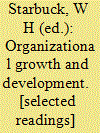

|
|
|
|
|
| Publication |
Harmondsworth, Penguin Books Ltd, 1971.
|
| Description |
383p.
|
| Series |
Penguin modern management readings
|
|
|
|
|
|
|
|
|
|
|
|
Copies: C:1/I:0,R:0,Q:0
Circulation
| Accession# | Call# | Current Location | Status | Policy | Location |
| 007523 | 658.1/STA 007523 | Main | On Shelf | General | |
|
|
|
|
| 10 |
ID:
034153


|
|
|
|
|
| Publication |
New Jersey, Prentice-Hall, Inc., 1972.
|
| Description |
xiii, 354pHbk
|
| Standard Number |
0-13-642033-8
|
|
|
|
|
|
|
|
|
|
|
|
Copies: C:1/I:0,R:0,Q:0
Circulation
| Accession# | Call# | Current Location | Status | Policy | Location |
| 009571 | 658.04/HAL 009571 | Main | On Shelf | General | |
|
|
|
|
| 11 |
ID:
038240


|
|
|
|
|
| Publication |
Cambridge, Cambridge University Press, 1970.
|
| Description |
170p
|
| Series |
Cambridge papers in sociology
|
| Standard Number |
0-521-09618-9
|
|
|
|
|
|
|
|
|
|
|
|
Copies: C:1/I:0,R:0,Q:0
Circulation
| Accession# | Call# | Current Location | Status | Policy | Location |
| 006127 | 658.02/ING 006127 | Main | On Shelf | General | |
|
|
|
|
| 12 |
ID:
139918


|
|
|
|
|
| Summary/Abstract |
This article proposes a political economy approach to decolonization. Focusing on the industrial organization of agriculture, it argues that competition between colonial and metropolitan producers creates demands for decolonization from within the metropole when colonies have broad export profiles and when export industries are controlled by colonial, as opposed to metropolitan, interests. The author applies this framework to the United States in the early 1900s, showing that different structures of the colonial sugar industries in the Philippines, Hawaii, and Puerto Rico–diverse exports with dispersed local ownership versus monocrop economies dominated by large US firms–explain why protectionist continental-agriculture interests agitated so effectively for independence for the Philippines, but not for Hawaii or Puerto Rico. A comparative historical analysis of the three colonial economies and the Philippine independence debates complemented by a statistical analysis of roll call votes in the Hare-Hawes-Cutting Act supports the argument. In providing a new perspective on economic relations in the late-colonial era, the argument highlights issues of trade and empire in US history that span the subfields of American political development, comparative politics, and international political economy.
|
|
|
|
|
|
|
|
|
|
|
|
|
|
|
|
|
|
|
|
|